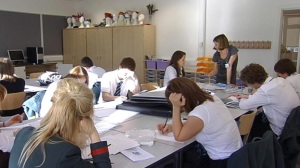Home » Yes 2014
Category Archives: Yes 2014
Voting NO is a gamble on UK plc
by Matthew Wilson, English Teacher, Edinburgh
Many teachers don’t take a huge interest in the details of economics but realise that economics underpins the quality of the service that we deliver and the morale of the staffroom, something as important as resources when it comes to teaching and learning.
I’ll start with a confession. I’m a politics and economics junkie for reasons too boring to go into. And in this blog, I’d like to outline why an independent Scotland is the best prospect for education in this country on purely economic grounds.
Teachers will have had a 20% pay cut in real terms by the time the most recent pay deal ends. This is greater than during the Great Depression. Budgets in schools have been cut and will continue to be cut for the foreseeable future. This means class sizes will go up. In my own department, we have gone from 8 full time teachers to 6; class sizes from low 20s to the 30s.
There are some who believe that if we just see this period through that things will start to pick-up. This is just another ordinary recession. It’s not. UK debts stands at 1.5 trillion. To give you an idea of how enormous this is here’s a fact: the UK spent 300 years building-up a debt of £500 bn. By 2015, a 1000 billion will have been added in just 8 years! Incredible. Yet the issue is not only the amount of debt, it’s the fact that the debt is stilling rising. The deficit of what we spend and what we earn is at 6%.
Without wanting to send you in to a tailspin of despair, there are some other important things to note. Real wages are down by 8.4% and the wages for the self-employed have dropped by 31% in real terms. Given that a lot of people have been registered as self-employed by job centers to make the figures look good, you can see that there has been a massive drop in personal income for many. All of this happening, despite hundreds of billions spent by the government to get the economy going.
What this means is that cuts are going to continue. Although it seems that the economy has improved, this has been due to short term stimulus to the housing market where the government pays part of the deposit? It boosts the building trade and supports the supply chain. Manipulation of the housing market has also helped. There are thousands of empty properties in the UK that cannot be sold by the banks in case they cause house prices to fall. A house price fall would mean people are in negative equity; they might then try to sell their house, or lose confidence and stop spending. Either would be a disaster for the economy.
To believe that the situation will improve in the near future, would mean believing that 1.5 trillion is going to go away, that the deficit can be turned into a surplus by borrowing more and that genuine growth is going to come back strongly to a society that is maxed out on credit cards and over-stretched on expensive mortgages. All of that looks impossible. It looks especially impossible when we realise that to realistically get out of this situation we will have to ask the rich to take a serious hit on their investments. Ask yourself if that is very likely in today’s UK? What it then does mean, if your answer is No to the rich taking a hit, is that there are more cuts and the cost of living crisis will accelerate.
The cost of living crisis is caused by wages not going-up and inflation eating into the spending power of your money. This has been going on for years now. My signature dish of chicken, peaches, creme fraiche and curry powder has increased by over 50% in price!
Inflation was the government’s traditional way of making debts smaller. The growth of inflation means a debt is worth less than it was. However, it only works if inflation outpaces interest rates and wages rise along with inflation and that requires low interest rates and high government spending. It is a sign of how much debt we’re in as a society that high government spending and ultra low interest rates cannot get wages to rise.
Where does an independent Scotland fit into all of this? Well, if there is no currency union we’ll be debt free and so are in a pretty good position. However, there will be a currency union so what will be the consequence of that?
A CU does entail us taking on debt, yet we will have more flexibility. Although we’ll still have a large government debt, we can expect to benefit from a quite a few things: we will be able to set up a state-owned energy company that can deliver oil and renewable at better prices. We will spend on infrastructure projects that will put money into people’s pockets, and this will improve the tax base. The extra money that Scotland pays to subsidise London will be returned to support spending up here. Our level of defence spending will be less, down from 3.3 bn to 1.8 bn, and all of it will be spent in Scotland, unlike now when only £800 million is spent in Scotland. The £4 bn of exports that are counted as UK exports because they leave from ports down south will now be taxed as they leave Scotland, further adding to the tax base.
When you add it all up an independent Scotland is in a very healthy financial position, and there’s potential for even more growth to improve things further. The Scottish government would be able to fund schools to the level of a few years ago and still pay down debt, if we elect a government to do that.
I am not saying that on day one of independence, teachers will get a pay rise and smaller class sizes. Nonetheless, the direction of travel will be the opposite of the UK at present. At the moment, the UK is slowly collapsing under the weight, not so much of debt, but of lack of vision. It should be learning from Germany, not trying to cover up its problems by letting the City of London have its way with everything which, in truth, means bailing itself out and passing the bill onto us. (The teacher pension scheme was in surplus.)
Scotland is learning. We know we have to re-industrialise, move away from an economy based on personal indebtedness and invest in the future. Our models are Denmark, Switzerland, Norway and other successful countries. Scotland has an unbelievable amount of natural resources and human potential. The tidal technology being trialled in Orkney could makes us 100% renewable in the next decade alone. If we’re smart, we’ll vote in a way that will allow us to use the what we have for the benefit of us all.
Poor pay for our young people has to change
by Matthew Wilson, English Teacher, Edinburgh
‘How much ye getting?’
‘It’s minimum wage and I’m just 18 so Ah’m gettin’ £5 an hour.’
‘That’s no bad.’
‘Yeah, but the minimum wage is about to go up in September by 20p…’
‘Yeah?’
‘…I know that 20p doesnae sound like a lot but if I work for 5 hours that’s an extra pound, an’ if I do that over a week that’s an extra £5 a week.’
‘That’s alright.’
This was a conversation that I heard between two teenage girls on the bus coming home from helping out with Jim Sillars on the Margo Mobile. Jim is going to working class communities and speaking to working people about having the confidence to shape their own future and protect their rights in an independent Scotland. The above conversation chimed with so much of what Jim and others are speaking about.
This conversation seemed to say something to me about where we are as a society and why an independent Scotland is so important. The minimum wage has been greatly reduced by the continual erosion of buying power caused by inflation. Teachers have had a 14% reduction in real wages over the past 7 years so this gives an insight into how the lowest paid have had their pay packets shrunk.
The first thing that struck me was that 20 pence is not a lot of money. I lost £20 the other day. It was annoying, but not upsetting; after all, what’s £20 in the scheme of things? Yet it would take that young girl 100 hours of overtime to earn that amount extra in her pay packet. I don’t think the outrageous thing is that I’m not bothered about £20: I think the outrage is how poorly paid that girl is.
Of course, being only 18 she has still to enter the highest bracket of the minimum wage. At 21, she will be eligible for £6.31. And that will be it. No more rises, except ones to keep the minimum wage in line with inflation, which in effect means no real rises. I have to wonder what kind of future she can build on £6.31 an hour?
The problem isn’t just the fact that the minimum wage is low. It is also the fact that Scotland does not have the industries to raise people’s pay levels. We don’t make stuff. Germany makes stuff and has millions of well-paid workers. In Scotland, at present, the working class has fewer choices of well paid work. An independent Scotland is promising re-industrialisation. Why can Scotland not do the same as Denmark, Norway and Iceland? We have greater resources than any of them, after all.
The other thing that struck me was how low the girl’s expectations were. A life of 20p pay rises is not one that many people would characterise as ‘good’. Low expectations indicate low self-esteem and, I can’t help thinking, leads a race to the bottom. Working people with low expectations will be played-off against each other so that they put up with poor pay and poor conditions. We’ll be going backwards.
As a teacher, I feel that all our efforts to boost skills and confidence count for very little if the society our young people enter in to offers the majority of them poor pay, poor conditions and poor prospects.
Why I will be voting Yes for my pupils’ future
by Kirsten Holman, Supply Teacher, South Lanarkshire
As a supply teacher I’m used to facing challenges; the child who doesn’t like change, the child who tries to get away without working as hard as usual, the child who spends all their time “helping” instead of working, but one thing I hope I never get used to is a child turning up to school hungry. I’m not talking about a child who forgets their snack for playtime once in a while, or the child who misses breakfast once. I’m talking about the child who consistently doesn’t get enough food.
The Westminster view is simple, blame the parents. “They probably spend all their money on Sky Tv”, “They spend it all on cigarettes and booze”, “They forget about their children.”.
That isn’t the situation I see all over my Authority however. I see working parents struggling to buy enough food. I see parents going without themselves to make sure the children get as much as possible. I see parents on benefit, who were already struggling, not coping after benefit cuts.
I’ve lost count of the number of times I’ve seen teachers and support staff give their own food to pupils, the slices of toast that have been “made accidently” and passed to the child who needs it more, the fruit that needs eaten that day. In a wealthy country it is wrong that our children are going hungry and relying on foodbanks to survive.
1 in 5 children in Scotland are born into poverty, 1 in 9 live in severe poverty (Save the Children, 2013). This isn’t acceptable in 2014. These children miss out on many of the educational experiences others take for granted such as school trips, after school clubs, or even having the toys that others are playing with in the playground. They also suffer from an educational barrier, the gap in reading attainment between pupils living in poverty and their peers is 22%, and the attainment gap in maths is 15% in Primary 7. These children therefore struggle more at Secondary school, leading to lower attainment and less chance to escape the poverty cycle.
We teach children to be effective contributors, responsible citizens. The Westminster Government just seems to put roadblocks in their way as they grow up. Yes, we have free higher education in Scotland, as compared to £9000 a year fees in England (which is another reason I’m voting Yes). This allows our children to develop according to their ability to learn, not their ability to pay. We also have a promise of 25,000 apprenticeships a year. However, these policies are dependent on the block grant from Westminster.
We have a devolved responsibility for education, but our ability to pay for it is controlled by Westminster. Does that fit with what we teach our pupils, to be responsible for their actions and to make their own decisions?
Scotland didn’t vote for the Government in Westminster; we didn’t vote for the same old cuts and pessimism. I’m voting YES because I want the children I teach to get the benefits of living in a wealthy country, a country that values education. I’m voting YES so that we can be optimistic about our children’s future.
Teachers explain why a Yes vote is good for Scottish education
Teachers speak out about their concerns regarding education at the moment and the hope and possibilities a Yes vote can bring.
Why I Support a Yes
by Matthew Wilson, English Teacher, Edinburgh
As a teacher, I encourage the young people of Scotland to show independence and take responsibility in their work and in their actions for the purpose of succeeding academically, but also to be rounded people capable of achieving the things they want in their own lives.
Teachers know that the pupil who does not take responsibility for their work will struggle to pass their exam. You cannot guarantee exam success completely; however, independent thought and responsibility in study is usually a key indicator and close-to-guarantee that an individual will learn and, ultimately, achieve a good result when it comes to an exam. Failure is certain if a student never accepts and applies those principles.
It’s not only exams that the values of independence and responsibility play a crucial role. It’s vital in our working lives. In teaching, we have a greater degree of freedom in our workplace than afforded to many other avenues of employment, and this means there is more scope to take or not take responsibility. In my teaching experience, failure to take responsibility for the tone of the class, for classroom management, to provide materials on a daily basis and deliver stimulating lessons is when classes fail in the most basic areas, and certainly leaves pupils lacking the skills required to be successful.
Even taking partial responsibility is not enough. Sometimes dealing with issues and then leaving them; sometimes turning-up with the right attitude, sometimes not; sometimes having high standards, sometimes letting things go, is just not enough. As teachers, we know that it’s not enough. It has to be full responsibility all the time, or as close to since we’re only human! And, if you don’t have the means for responsibility, then you have to have independence to claim the power to exercise your responsibilities, whether that’s making sure you have the resources you need, or that you get to manage classes in a way that fits with your own style. I remember my early lessons as a student: horrendous, most of them. Partly because I did not have responsibility to teach in my own style – mainly because I knew nothing! But as an experienced teacher, being able to exercise my responsibilities in the way I see best, is important to my teaching and, in my opinion, has improved my teaching no end. Nothing forces improvement like taking responsibility.
What is true on an individual level is true on a wider, community level. A department that does not take responsibility will be a failing department. A school whose members do not take responsibility will be a failing school. Responsibility does not mean mistakes are not made. It is not a cure-all. What it does mean is that problems are addressed, mistakes are corrected, successes are built-upon, and life is slowly made better.
As a teacher, I know that a school shapes the identity of its young people and it is important that that identity be positive. For that identity to be positive there has to be a culture of independence and responsibility in the school. The alternative is training, instead of teaching; controlling instead of leading.
How much of this is true at the level of a political community? Scotland is a community just like any school. It is important to the citizens of Scotland, especially to the young people of Scotland, that the identity of their nation be a positive identity. It will make a difference to their lives. Yet that can only happen in a culture of responsibility and independence. People need to live in a community where independence and responsibility are the norm. We’ve all seen the tragic results in our teaching lives when that is not the case. You would not have to look too hard to see that some of Scotland’s statistics are among the worst in the developed world and point to diminished responsibility in some areas of our country.
Scotland does not fully have that culture of responsibility yet, and therefore, does not have the positive identity that we, as wards of young people, might hope it to have. We have a community that is, ultimately, someone else’s responsibility. And, I would argue, that being far removed in location and in social sphere, the people who do have both the power and responsibility have little motivation to exercise it in beneficial ways. The effect of this we see in poverty statistics, alcohol abuse statistics, drug abuse, and health issues. How many of these issues would start to be resolved if individuals and communities had the power to take responsibility for themselves? The power to take responsibility and the example of responsibility is denied to them in key areas of our society, because we are not indpendent. Our political discussion, our vision, our abilities and hopes are limited by this.
A ‘Yes’ vote would be a step, a huge step, both symbolic and actual, in the direction of increasing independence and responsibility. As a teacher, I want to see a society of independent people who take responsibility for their lives up to and including the responsibility of governing themselves. I think that would benefit young people. I don’t want my words in the classroom, urging responsibility, to be meaningless. I don’t want to represent a system that, at the very top political levels, does not and cannot take responsibility and see that lack of responsibility filter down through society. Or teach and try to encourage young people about these things when their own political community has rejected responsibility and independence.
This is why I am voting Yes and encourage others to do the same: not for wealth or riches (or £500 a year), but for responsibility and independence to make and to continue to make the changes we need for years to come that I feel will benefit the confidence and self-esteem of all in our society, especially the young.




